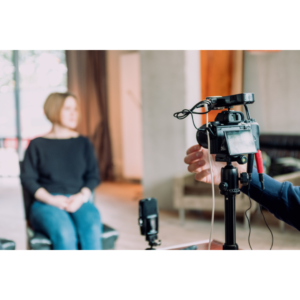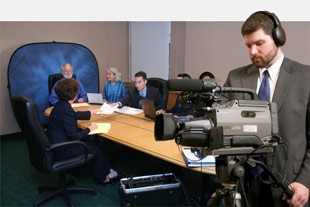The Function of Legal Videography in Depositions and Tests
Legal videography has actually arised as a vital tool in both depositions and trials, giving a multifaceted approach to documenting witness statements. As lawful professionals significantly recognize its value, it triggers a deeper evaluation of just how these aesthetic documents can influence juror assumptions and test results.
Relevance of Legal Videography
Legal videography plays a critical role in the documentation and presentation of depositions and tests. This customized field incorporates technical skills with legal expertise to produce a dependable document of proceedings that can considerably affect situation outcomes. The appearance of legal videography improves the understanding of witness testament, allowing jurors and judges to observe not only the spoken words but also the demeanor, emotions, and body language of the witnesses.

The importance of legal videography prolongs beyond the court room; it additionally plays a vital function in maintaining evidence for future reference, whether for charms or further lawful activity. Its integration into the lawful process is important for making certain a reasonable and accurate representation of the realities, eventually contributing to the quest of justice.

Refine of Legal Videography
While catching the subtleties of depositions and tests, the procedure of legal videography entails numerous essential actions that ensure top notch, exact recordings. An expert lawful videographer prepares by assessing the instance products and understanding the details requirements of the deposition or test. This preparation consists of acquainting themselves with the individuals and the context, which helps in capturing relevant information.
On the day of the recording, the videographer sets up the needed tools, which generally includes high-definition cams, microphones, and correct illumination. Making sure optimum angles and sound quality is critical, as it directly affects the efficiency of the recording. The videographer connects with lawyers and participants to establish protocols, making sure that everyone recognizes the recording procedure.
Throughout the deposition or test, the videographer thoroughly records the procedures, paying attention to both verbal and non-verbal hints. legal videography. This includes catching the demeanor and responses of witnesses and lawyers. After the session wraps up, the videographer may modify the footage for clarity and compliance with lawful standards, generating an end product that accurately mirrors the proceedings for future reference and usage in lawful contexts
Benefits in Depositions
The unification of videography in depositions supplies various advantages that improve the general procedure of collecting proof. One primary benefit is the ability to capture witness testaments with visual and acoustic integrity, giving a more exact representation of the witness's attitude, tone, and body movement. This multidimensional technique enables lawyers and courts to analyze reputation better than traditional written records alone.
Additionally, videographed depositions act as an effective device for preserving testament. Must a witness ended up being unavailable for test, their tape-recorded deposition can be played in court, making sure that their evidence remains available and relevant. This element substantially minimizes the danger of losing essential info that might impact instance results.
Furthermore, using lawful videography advertises better preparation for attorneys. Assessing video footage enables legal groups to examine and refine their approaches, determining toughness and weak points in their cases. This preparatory advantage can bring about even more engaging discussions in court.
Finally, videography enhances the total professionalism and reliability of the deposition procedure, instilling confidence in customers regarding the thoroughness of their lawful representation. By leveraging technology, attorneys can dramatically improve the effectiveness of depositions.
Effect On Tests
In lots of tests, the combination of videography can significantly affect the presentation of evidence and the court's perception. Legal videography records witness testaments and vital proof in a dynamic style, allowing jurors to involve with the product on multiple degrees. This visual component improves the storytelling facet of a test, offering context and psychological vibration that standard text-based evidence might lack.
Moreover, video clip recordings can offer as effective tools for browse around this site impeachment throughout interrogation. When discrepancies arise between a witness's previous statements and their courtroom testimony, video proof gives an objective recommendation that can guide jurors' viewpoints. This immediacy and quality can strengthen the reputation of a party's narrative while simultaneously undermining opposing disagreements.
Furthermore, using videography can help improve complicated details, making it much more that site obtainable to jurors who might struggle to comprehend complex information offered exclusively via verbal statement. By integrating visuals with auditory information, legal videography can improve retention and understanding, eventually affecting the court's decision-making process. The impact of videography in trials extends beyond mere aesthetics; it plays a critical role in shaping the legal landscape and results.
Future Trends in Legal Videography
As we look towards the future of legal videography, a number of arising patterns assure to reshape its duty within the court. One significant fad is the integration of artificial knowledge (AI) in video analysis and editing and enhancing - legal videography. AI can enhance the procedure of recognizing vital moments in videotaped depositions, permitting attorneys to quickly access pertinent content, thereby improving efficiency in instance preparation
In addition, the increase of digital truth (VR) and increased truth (AR) innovations is expected to transform exactly how jurors experience evidence. By submersing jurors in a substitute setting, these innovations can provide a more profound understanding of intricate scenarios, resulting in even more enlightened deliberations.

Furthermore, the boosting demand for remote depositions, increased by the COVID-19 pandemic, will likely continue. Lawful videographers will require to adapt to brand-new software application and systems to make sure high-grade recordings in online setups.
Lastly, the expanding focus on data security will certainly require stricter protocols for storing and sharing video evidence. As the lawful landscape progresses, lawful videographers must stay abreast of these fads to preserve their relevance and effectiveness in the judicial click here for more procedure.

Conclusion
In recap, lawful videography offers an important function in the judicial procedure, improving the integrity of depositions and tests. By capturing the nuances of witness statements, this medium not just maintains necessary evidence but also aids in providing details efficiently to jurors. The value of visual paperwork in evaluating integrity and promoting interrogation can not be overemphasized. As innovation proceeds to advance, legal videography is positioned to additional change its duty within the lawful landscape.